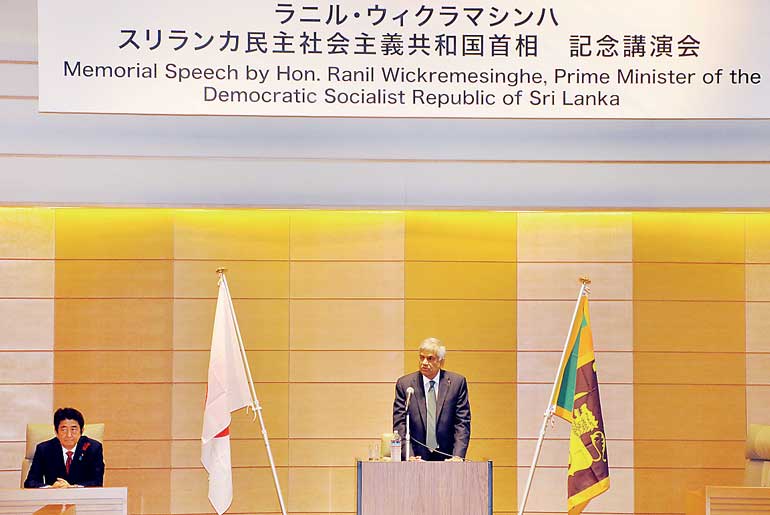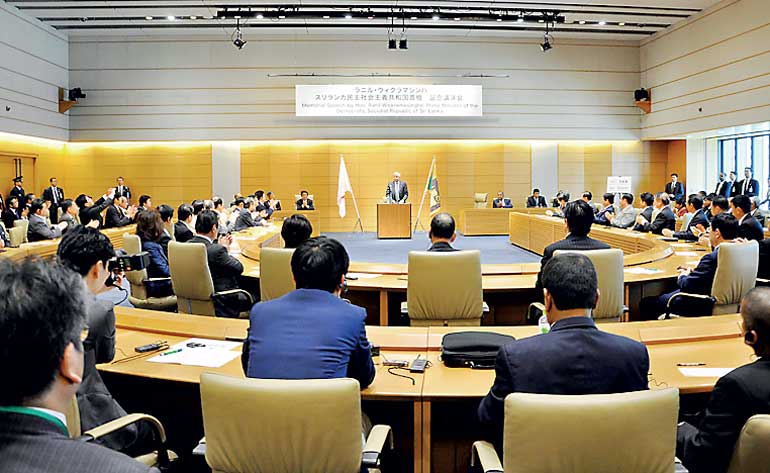Saturday Feb 21, 2026
Saturday Feb 21, 2026
Wednesday, 7 October 2015 00:05 - - {{hitsCtrl.values.hits}}

Prime Minister Ranil Wickremesinghe speaking at the Japanese Parliament last morning as Japanese PM Shinzo Abe looks on – Pix by Pradeep Pathirana

Prime Minister Ranil Wickremesinghe yesterday urged Japan’s Parliamentarians to back stronger relations with Sri Lanka and spearhead its links with Southeast Asia to foster planned development and peace building.
Delivering a memorial lecture at special conference hall 6 of the Japanese Parliament in the presence of Japanese Prime Minister Shinzo Abe, Wickremesinghe outlined extensive plans for development before the members and requested assistance on multiple fronts.
He also called for Japan’s support to hold a summit for the social and economic development of the north and east for reconstruction and development.
Recalling strong historical connections with Japan that began during Prime Minister D.S. Senanayake’s time and which grew during the tenure of President J.R. Jayewardene, the Prime Minister insisted the time has come to expand relations to improve Japanese investment in Sri Lanka.
Wickremesinghe’s address was only the third delivered by a world leader to the Japanese Parliament. Only US President Barrack Obama and Indian Premier Narendra Modi have addressed this Parliament. The Prime Minister’s half-hour speech was received with a standing ovation by the Japanese Parliamentarians.
“The National Government of Sri Lanka will work to remove any barriers towards Foreign Direct Investment from Japan. We will put in place a system that will fuse investment parallel to infrastructure development and other monetary assistance gained by Sri Lanka from Japan,” he told Parliamentarians.
Impressive technology and science development in Japan will provide significant assistance to Sri Lanka as the country looks to increase its growth over the next few years, Wickremesinghe noted.
He also specified Japanese assistance to improve local inter-institutional cooperation, establish special organisations to modernise science and technology, build a new technical institute along Japanese standards to develop local science and technology, use Japanese knowledge to combat effects of climate change and promote local human resources.
“In addition to investment, the Sri Lankan Government will work to attract more Japanese tourists and will remove all bottlenecks of bilateral trade and investment,” he added.
Dwelling on international trade in the Indian Ocean, Wickremesinghe assured the Japanese Government Sri Lanka was committed to transparency and adherence to international law on ocean matters and would support free trade in the region.
Japan’s relations with Sri Lanka would also pave the way for stronger links with India and in turn spur the growth of the entire Asian region, the Prime Minister said. Such a step would also increase the standard of living in the region. South Asia with its large population, which is expected to grow to two billion by 2050 exceeding the numbers of East Asia, would be the next platform for global growth.
“The best way to respond to slow global recovery is to energise growth in Asia,” Wickremesinghe went on to say.
Wickremesinghe also extensively debriefed Japanese Parliamentarians on the political changes that have taken place in Sri Lanka since January and its commitments at the United Nations Human Rights Council (UNHRC) earlier this month.
He assured Japan of the National Government’s commitment and dedication to fostering reconciliation and praised assistance by the Japanese Government during the Cease Fire Agreement and subsequent peace-building initiatives.